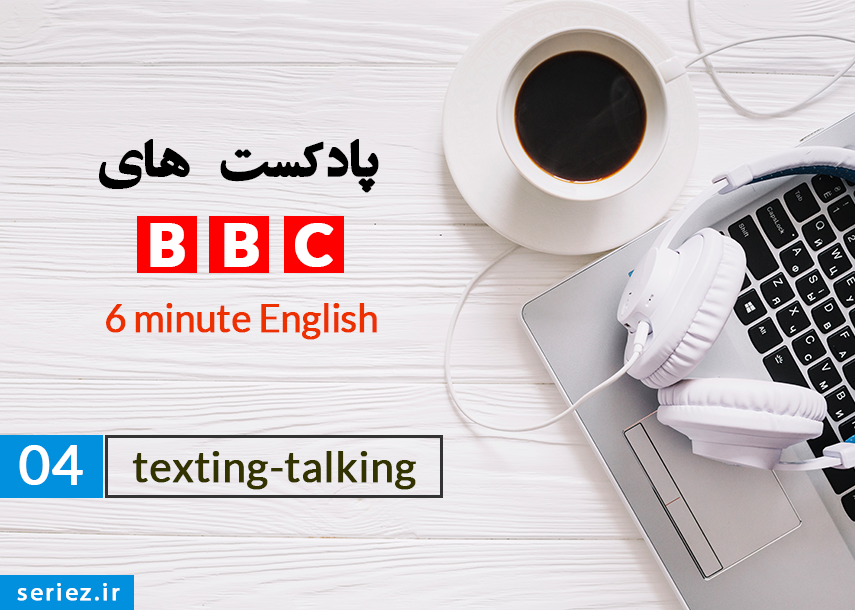پادکست های BBC 6 minute English – texting-talking

قسمت چهارم پادکست های BBC 6 Minute English
در بخش چهارم پادکست های ۶ دقیقه ای بی بی سی، 6 لغت مهم با محوریت موضوع texting-talking (پیام دادن-حرف زدن) بررسی می شود.
- ابتدا پادکست را بدون متن گوش کنید.
- آن را دوباره به همراه متن گوش دهید و
- در مرحله آخر لغات آن را مرور کنید.
.
دانلود پادکست قسمت چهارم (texting-talking) قسمت BBC 6 Minute English
.
دانلود Pdf متن پادکست این قسمت BBC 6 Minute English
.
.
لغات این قسمت از BBC 6 Minute English
intonation زیر و بمی صدا
Ex: The teacher checks for pronunciation and intonation.
معلم، تلفظ و لهجه را چک می کند.
نکته: به عنوان مثال: سوالات Yes/No در زبان انگلیسی دارای rising intonation بوده و سوالات اطلاعاتی falling intonation.
intention منظور، قصد
Ex: it was not my intention to hurt your feelings
منظورم این نبود که احساسات شما را جریحه دار کنم.
phrase عبارت، اصطلاح
Ex: the phrase “to be married” is commonly understood after the word “engaged”
عبارت ((قرار است ازدواج بکنند)) معمولا در واژهی ((نامزد)) مستتر است.
in person حضوري، رو در رو
Ex: You had better go and speak to him in person
بهتره بری حضوری باهاش حرف بزنی.
get annoyed ناراحت شدن
Ex: The kids wouldn’t stop talking, and I was beginning to get annoyed with them
بچه ها یه ریز حرف میزدند به خاطر همین داشتم از دستشون ناراحت میشدم.
نکته: با حرف اضافه with به کار میرود.
minefield / treading on mines شرایط سخت برای تصمیم گیری
Ex: Without a good lawyer, buying a house can be a minefield of legal problems.
بدون وکیل، خونه خریدن میتونه شرایط سختی را برای تصمیم گیری برسر مسایل قانونی بوجود بیاورد.
.
.
نوبت شماست:
سعی کنید به سوال زیر پاسخ دهید و در پاسخ خود تمام لغات این قسمت را استفاده کنید.
.
ِHow can texting change the phrases?
Do you text while talking to someone?
جواب هاتون رو کامنت کنید…
.
متن پادکست BBC 6 Minute English
Neil
Hello. This is 6 Minute English from BBC Learning English. I’m Neil.Georgina
And I’m GeorginaNeil
Can I ask you something, Georgina…?Georgina
Mm-mm-hmm.Neil
Georgina? I said, I want to ask you something… are you listening to me?!Georgina
Mm-hmm, just a second, Neil, I’m texting a friend…Neil
Ah, has this ever happened you? Someone too busy texting to talk. With the huge rise of mobile phones in recent decades, communicating by text has become more and more popular and scenes like this have become increasingly common.Georgina
…and send! There, all done! Now, what were you saying, Neil?Neil
In this programme, we’ll be investigating why people often choose to text, instead of talk to the people in their lives. We’ll be asking whether this popular form of communication is changing how we interact with each other.Georgina
And, of course, we’ll be learning some related vocabulary as well. Now, Neil, what did you want to ask me?Neil
My quiz question, Georgina, which is this. Young people are often the biggest users of mobile phones, but in a 2016 study, what percentage of British teenagers said they would prefer to send a text rather than speak to someone, even if they were in the same room? Is it:a) 9 percent?,
b) 49 percent?, or,
c) 99 percent?Georgina
That sounds pretty shocking! I can’t believe 99 percent of teenagers said that, so I’ll guess b) 49 percent.Neil
OK, Georgina. We’ll find out later if that’s right. In one way, the popularity of texting, sometimes called ‘talking with thumbs’, is understandable – people like to be in control of what they say.Georgina
But this low-risk way of hiding behind a screen may come at a cost, as neuroscientist, Professor Sophie Scott, explained to Sandra Kanthal, for BBC World Service programme, The Why Factor:Sandra Kanthal
When we ‘talk with our thumbs’ by text or email or instant message, we’re often prioritising speed over clarity and depth. But when we can’t hear the way someone is speaking it’s all too easy to misunderstand their intention.Sophie Scott
So if I say a phrase like, ‘Oh shut up!’ – has a different meaning than, ‘Oh shut up!’ There’s an emotional thing there but also a strong kind of intonation: one’s sort of funny, one’s just aggressive. Written down it’s just aggressive – ‘Shut up!’ – and you can’t soften that. […] We always speak with melody and intonation to our voice and we’ll change our meaning depending on that. You take that channel of information out of communication you lose another way that sense is being conveyed.Neil
When reading a text instead of listening to someone speak, we miss out on the speaker’s intonation – that’s the way the voice rises and falls when speaking.Georgina
Intonation, how a word is said, often changes the meaning of words and phrases – small groups of words people use to say something particular.Neil
Reading a phrase like, ‘Oh shut up!’ in a text, instead of hearing it spoken aloud, makes it easy to misunderstand the speaker‘s intention – their aim, or plan of what they want to do.Georgina
And it’s not just the speaker’s intention that we miss. A whole range of extra information is conveyed through speech, from the speaker’s age and gender to the region they’re from.Neil
Poet, Gary Turk, believes that we lose something uniquely human when we stop talking. And there are practical problems involved with texting too, as he explains to BBC World Service’s, The Why Factor:Gary Turk
If you speak to someone in person and they don’t respond right away, that would be rude. But you might be speaking to someone in person and someone texts you… and it would be ruder for you then to stop that conversation and speak to the person over text… yet the person on the other side of the text is getting annoyed – you haven’t responded right way – it’s like we’re constantly now creating these situations using our phones that allow us to like tread on mines – no matter what you do, we’re going to disappoint people because we’re trying to communicate in so many different ways. Do you prioritise the person on the phone? Would you prioritise the person you’re speaking to? Who do you disappoint first? You’re going to disappoint somebody.Georgina
So what should you do if a friend texts you when you’re already speaking to someone else in person – physically present, face to face?Neil
You can’t communicate with both people at the same time, so whatever you do someone will get annoyed – become angry and upset.Georgina
Gary thinks that despite its convenience, texting creates situations where we have to tread on mines, another way of saying that something is a minefield, meaning a situation full of hidden problems and dangers, where people need to take care.Neil
Yes, it’s easy to get annoyed when someone ignores you to text their friend…Georgina
Oh, you’re not still upset about that are you, Neil?Neil
Ha, it’s like those teenagers in my quiz question! Remember I asked you how many teenagers said they’d prefer to text someone, even if they were in the same room.Georgina
I guessed it was b) 49 percent.Neil
Which was… the correct answer! I’m glad you were listening, Georgina, and not texting!Georgina
Ha ha! In this programme we’ve been discussing ways in which texting differs from talking with someone in person – or face to face.Neil
Sending texts instead of having a conversation means we don’t hear the speaker’s intonation – the musical way their voice rises and falls. A phrase – or small group of words – like ‘Oh shut up!’, means different things when said in different ways.Georgina
Without intonation we can easily misunderstand a text writer’s intention – their idea or plan of what they are going to do.Neil
Which in turns means they can get annoyed – or become irritated, if you don’t understand what they mean, or don’t respond right away.Georgina
All of which can create an absolute minefield – a situation with many hidden problems, where you need to speak and act carefully.Neil
And that’s all we have time for in this programme, but remember you can find more useful vocabulary, trending topics and help with your language learning here at BBC Learning English. We also have an app that you can download for free from the app stores and of course we are all over social media. Bye for now!Georgina
Bye!.


دیدگاهتان را بنویسید
برای نوشتن دیدگاه باید وارد بشوید.